|
|
|
Sort Order |
|
|
|
Items / Page
|
|
|
|
|
|
|
| Srl | Item |
| 1 |
ID:
115295
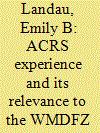

|
|
|
|
|
| Publication |
2012.
|
| Summary/Abstract |
This article examines the arms control logic that was applied to the only regional arms control talks that have taken place in the Middle East to date: the Arms Control and Regional Security (ACRS) working group that was part of the multilateral track of the Madrid peace process in the early 1990s. It highlights both the successes and major constraints of the ACRS talks in an effort to assess what might be relevant to the weapons of mass destruction-free zone conference proposed for later this year. In addition to the basic arms control dilemmas that will continue to challenge this conference-as they did ACRS-the article suggests that current conditions in the Middle East are even less conducive to regional dialogue than they were in the earlier period, due to the internal upheavals in several key Arab states, and the specific challenge of Iran's move to develop a military nuclear capability.
|
|
|
|
|
|
|
|
|
|
|
|
|
|
|
|
| 2 |
ID:
115298
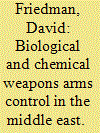

|
|
|
|
|
| Publication |
2012.
|
| Summary/Abstract |
Nonproliferation policies to prevent biological and chemical weapons use are important, but insufficient, particularly in view of the rise of global terrorism. Given the history of developing and using these weapons, it is crucial that governments properly prepare for biological and chemical threats, whether naturally occurring or man-made, such as by developing and managing effective healthcare infrastructure to mitigate widespread illness and injuries resulting from pandemics or terrorist attacks. Although the Middle East is one of the most sensitive and complex areas in the world-especially regarding regional arms control efforts and prevention-coordinating preparedness strategies among states in the region may be possible. Cooperatively addressing biological and chemical threats could lead to constructive progress towards the otherwise elusive goal of establishing a weapons of mass destruction-free zone in the Middle East.
|
|
|
|
|
|
|
|
|
|
|
|
|
|
|
|
| 3 |
ID:
115296
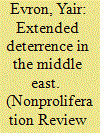

|
|
|
|
|
| Publication |
2012.
|
| Summary/Abstract |
The article presents and analyzes the US extended deterrence commitments in the Middle East as well as those provided by regional states, and assesses the effectiveness and credibility of these commitments. The article then proceeds to analyze a situation wherein Iran successfully develops nuclear weapons. It considers first the security requirements and alternatives of Gulf Cooperation Council (GCC) states, and then proceeds to assess the stability-or instability-of an Israeli-Iranian nuclear balance. The enhancement of US extended deterrence in the region is required in order to deter Iran, reassure allies, and contribute to the stability of an Israeli-Iranian nuclear balance. The article also discusses several contextual issues, such as: the future form of US extended deterrence; distinguishing between the latter and other US extended deterrence commitments; and the different approaches of specific GCC states and Israel.
|
|
|
|
|
|
|
|
|
|
|
|
|
|
|
|
| 4 |
ID:
115300
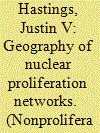

|
|
|
|
|
| Publication |
2012.
|
| Summary/Abstract |
This article uses a geographic approach to examine one aspect of the nuclear black market: the coordinators who bring buyers and sellers together, and transport goods between them. The most important factor in determining the geographical structure of a proliferation network is the network coordinator's access (or lack thereof) to unique state resources. Coordinators with access to state resources and prerogatives can avoid embedding themselves in hostile countries or relying on commercial infrastructure, often leading to territorially diffuse logistical networks. Coordinators without such access are forced to rely on commercial infrastructure and favorable local political, economic, and social conditions, often resulting in territorially centralized logistical networks. This is illustrated through case studies of Abdul Qadeer Khan's supply networks to Pakistan, Libya, and Iran. The article concludes with some observations about the implications of a geographical approach for understanding nuclear proliferation networks.
|
|
|
|
|
|
|
|
|
|
|
|
|
|
|
|
| 5 |
ID:
115294


|
|
|
|
|
| Publication |
2012.
|
| Summary/Abstract |
The Middle East is a crucial region for the global nonproliferation regime. In 2010, the state parties to the Treaty on the Non-Proliferation of Nuclear Weapons proposed a conference on a Middle East Weapons of Mass Destruction-Free Zone. The nuclear weapon-free zone model, on which this idea builds, has achieved important results in other regions, but faces especially stark challenges in the Middle East. However, the attempt to apply the boldly imaginative zone approach to the Middle East holds promise for building a more inclusive dialogue on nonproliferation and regional security.
|
|
|
|
|
|
|
|
|
|
|
|
|
|
|
|
| 6 |
ID:
115299
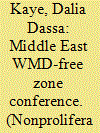

|
|
|
|
|
| Publication |
2012.
|
| Summary/Abstract |
This article reviews the origins and evolution of the Middle East weapons of mass destruction-free zone (WMDFZ) concept and the proposal for a 2012 conference on the subject, and explores new challenges and opportunities for regional arms control in the current regional environment. It suggests that new models may be necessary to revitalize regional arms control efforts. The establishment of a broad regional security forum could include, but should not be limited to, curtailing weapons of mass destruction through the zone approach. Even if the 2012 conference fails to materialize, or is limited to a one-time event, the proposal for such a conference has provided an important opportunity to rethink future options for a regional arms control and security process.
|
|
|
|
|
|
|
|
|
|
|
|
|
|
|
|
| 7 |
ID:
115301
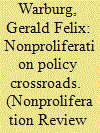

|
|
|
|
|
| Publication |
2012.
|
| Summary/Abstract |
On October 1, 2008, Congress enacted a proposal that originated with President George W. Bush in 2005 to approve an unprecedented nuclear trade pact with India by removing a central pillar of US nonproliferation policy. Despite the numerous political challenges confronting the Bush administration, the initiative won strong bipartisan support, including votes from Democratic Senators Joseph Biden, Hillary Clinton, and Barack Obama. The four-year struggle to pass the controversial US-India nuclear trade agreement offers an exceptionally valuable case study. It demonstrates a classic tradeoff between the pursuit of broad multilateral goals such as nuclear nonproliferation and advancement of a specific bilateral relationship. It reveals enduring fault lines in executive branch relations with Congress. It vividly portrays challenges confronting proponents of a strong nonproliferation regime. This article is based on an analysis of the negotiating record and congressional deliberations, including interviews with key participants. It assesses the lessons learned and focuses on three principal questions: how did the agreement seek to advance US national security interests?; what were the essential elements of the prolonged state-of-the-art lobbying campaign to win approval from skeptics in Congress?; and what are the agreement's actual benefits-and costs-to future US nonproliferation efforts?
|
|
|
|
|
|
|
|
|
|
|
|
|
|
|
|
| 8 |
ID:
115297


|
|
|
|
|
| Publication |
2012.
|
| Summary/Abstract |
With the exception of Iran, no Middle Eastern state has an operating nuclear power reactor. Several states, including the United Arab Emirates, Saudi Arabia, Qatar, Kuwait, Israel, Syria, Jordan, Turkey, and Egypt are considering constructing such reactors; some have even taken steps towards commencing nuclear power projects. There exist, however, considerable economic, technical, safety, and security challenges to achieving these goals, many of which are acute in the Middle East region. Regional and international cooperation on nuclear technology could not only help regional states meet their energy objectives, but it could also help to build trust among states as a basic step towards a future Middle East Weapons of Mass Destruction-Free Zone.
|
|
|
|
|
|
|
|
|
|
|
|
|
|
|
|
|
|
|
|
|